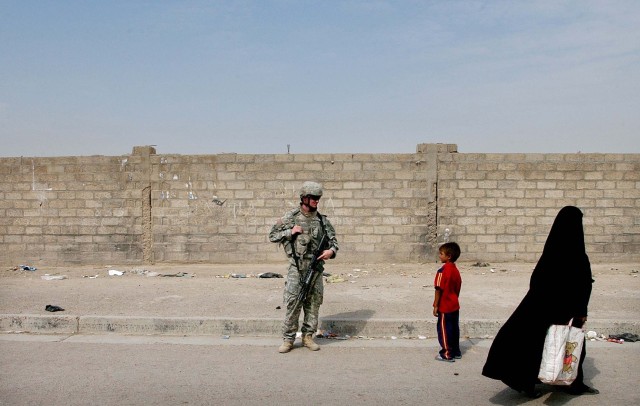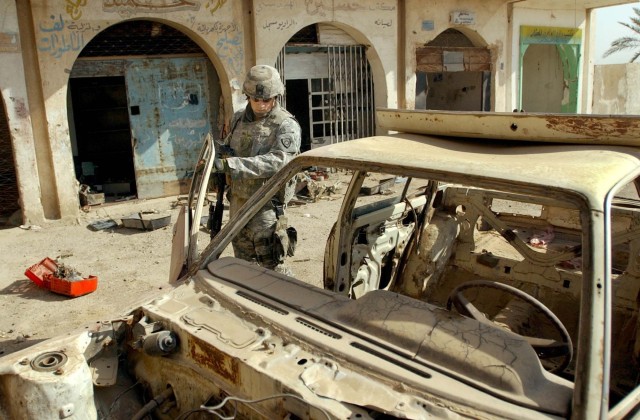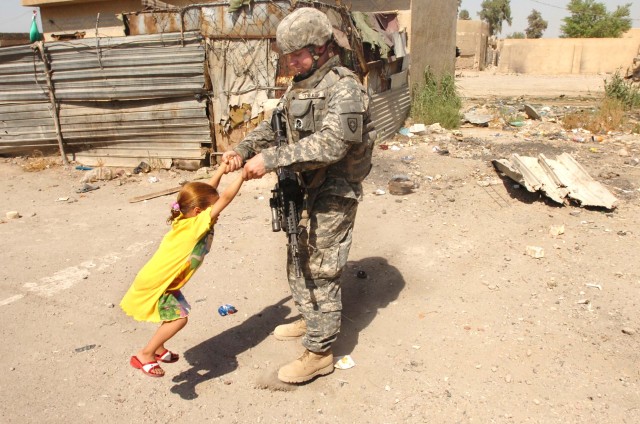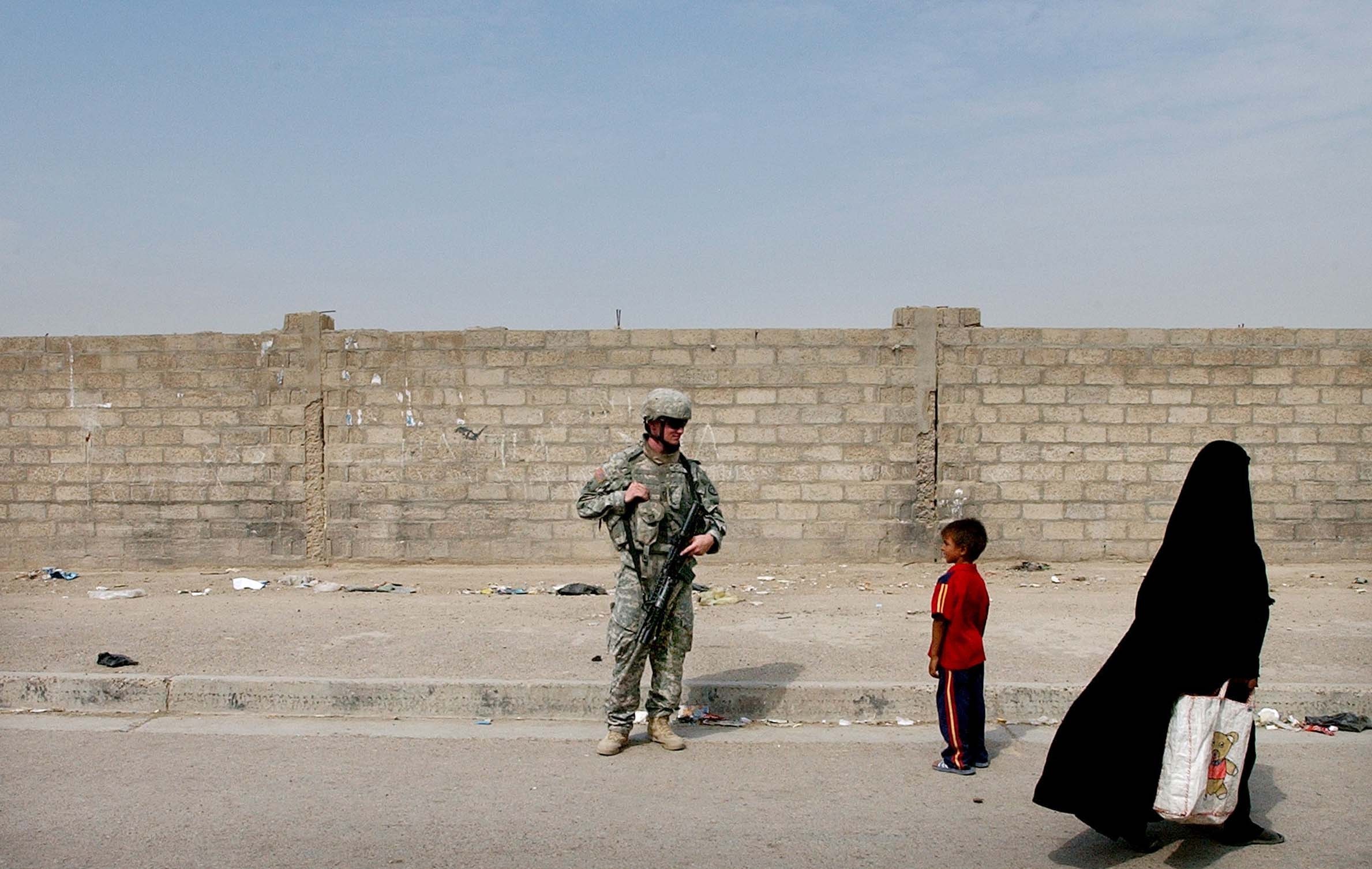BAGHDAD (National Guard Bureau, Oct. 3, 2007) - The call came across the radio as the Humvee rattled and shook down a dirt road in the Al Furat section of Baghdad - shots from an abandoned building directed at Soldiers manning guard towers of nearby Camp Slayer.
Immediately the Soldiers in the patrol turned their vehicles around and headed toward the building. They cordoned the block and with turret gunners providing overwatch, the Soldiers dismounted and moved quickly across the grounds of the building. Once inside, they moved with practiced ease down the separate corridors, clearing each room as they went.
In the end, the building was empty. However, a room with a view of one of the towers contained evidence of recent activity. But for the Soldiers, assigned to the Kentucky Army National Guard's Company A, 1st Battalion, 149th Infantry Regiment, kicking in doors and clearing rooms was something they hadn't done since their first days patrolling this section of southwest Baghdad, a section that since then has seen a dramatic turn around.
When the unit first arrived in Iraq in late 2006, kicking in doors in Al Furat, which is the unit's main area of responsibility, was nearly all they did.
"The area we're in now, when we first got here was, I don't want to say unpatrolled, but it was kind of left alone by U.S. forces," said Sgt. Dustin Thompson, a scout with the unit. "We were the first ones to patrol there in a long time. So, it was pretty rowdy when we first got here. We were getting shot at everyday."
Others described it differently.
"We called it the Wild West, because that's what it was like," said Lt. Col. John Luttrell, battalion commander. "There was a gunfight everyday."
The problems facing the area, unit members said, could be traced back to one source-sectarian violence between Sunni and Shi'a gangs, to include some with links to Al Qaeda and other violent factions. Al Furat, which has a largely Sunni population, is separated from neighboring Al Jihad, a mostly Shi'a area, by a canal. Buildings that line the roadway along the canal on both sides bear the scars of factional violence in the form of bullet holes, shattered windows and blackened areas from rocket-propelled grenade attacks. Many who live in the area have been injured, killed or worse, or they know someone who has been. Though attacks were mainly sectarian in nature, U.S. forces were targeted as well. The question for the unit was how to overcome those odds and return Al Furat, a once stable and prosperous area, to how it once was.
Building relationships was the answer, said Lt. Col. Luttrell, a former schoolteacher. Through dismounted patrols and talking with various people in the area the Soldiers in the unit worked with local sheiks and tribal leaders as well as other key members of the community who had unofficially taken on leadership roles. Through those connections a city council was formed. Initially the leadership positions of the council were filled with the individuals the Soldiers first talked with, but recently elections were held and community members elected those they felt would best serve those functions, said Lt. Col. Luttrell.
While the Soldiers were able to largely keep violence down in the area through both routine presence patrols and working with Iraqi army and national police units who manned checkpoints in the area, the area's economic and infrastructure needs had to be met.
"We've had several projects," said Sgt. Thompson. "We're building markets and improving schools, roads." The projects are funded by the U.S., but employ those in the area to do the actual work. One of the first areas to be rebuilt was the local market place, where local vendors offer everything from tennis shoes to fresh meat-the animals having been slaughtered that morning.
"The goal of our's has been to boost the economy and allow the locals to sustain themselves and not depend on us," said 1st Lt. Martin Schafer, a platoon leader with the unit. "One way of doing that is to allow them trade to make money."
Most mornings find the open-air market area packed with those doing daily shopping. So much so an expansion is being constructed.
"As we progressed through the year we've had a bigger and bigger presence," said 1st Lt. Schafer. "And that market, as we've increased our presence, has increased as well and at this point we're funding an addition to the market. We hope this addition continues to grow and continues to make it an economic boost for the community." Other projects include a pharmacy, a coffee shop and refurbishing local secondary schools. The unit and the Al Furat Council have also been working with the Iraq Ministry of Education to turn a now vacant building into a university, which many may say is fitting as it once housed a meteorological technical school.
While refurbishing the building to house a university may be a future event, the Soldiers of the unit are quick to point out the changes that have happened in the area currently.
"Primarily, at this present time, we don't get shot at as often," said Spc. Leonard Pitman, a tracked-vehicle mechanic assigned to the unit as a driver. "The neighborhood has gotten a lot safer for the residents."
And that feeling of safety is evident in other ways.
"Certain areas of the town are not occupied anymore, but the local residents are starting to come back in because people are starting to feel safe," said Spc. Pitman.
Those who live in the area expressed similar feelings.
"Today we find ourselves much more stable," said Ahmed Selman Abbas, chairman of the Al Furat City Council, through an interpreter. "And definitely at the end of 149th Infantry Regiment service in Furat, they will leave their fingerprint on the community."
That fingerprint, in part, came from working with the local community.
"Lt. Col. Luttrell invited us to share in the responsibilities and to make the neighborhood much more safe and much more stable," said Dr. Tahrir Aldelaimi, a dentist in Al Furat and also a member of the city council.
While military expertise factored greatly into rebuilding the area, it was also Lt. Col. Luttrell's civilian experience as a high school teacher that rang a bell with many in Al Furat.
"I think we are very lucky to find a commander, a teacher, like Lt. Col. Luttrell," said Mr. Abbas. "His personal background, his academic teaching, because he is so close to the community by teaching secondary school."
While the Soldiers of the unit assisted with the establishment of the city council, the council itself has established other means to better the neighborhood. One of which is the Furat Advisory Board for Reconstruction, which draws on the experiences of those in the area to oversee rebuilding efforts.
"This board consists of 10 members presented by Furat City Council and the engineering staff of the neighborhood," said Mr. Abbas. "This will take the opportunity to assist, to design, to monitor and give the whole picture of any project that is going to proceed in the neighborhood. It's like quality control for engineering work, actually."
The advisory board would not have seen the light of day if it wasn't for the efforts of the Soldiers of the unit, said Mr. Abbas, who added that the unit's work in the neighborhood has set the standard for other units throughout Iraq.
"We hope that the 149th's experience in Furat should be a model or example to be adopted for other coalition forces or units," said Mr. Abbas.
And the unit's efforts in Al Furat have been felt in other areas in Baghdad.
"Steps and procedures taken by our city council have been adapted by other city councils in Baghdad," said Mr. Abbas.
But for the Soldiers in the unit, it really comes down to one thing.
"We just have to make it a better place for the children to grow up in," said Spc. Pitman.






Social Sharing